Organisational Behaviour: Motivation, Team Dynamics and Culture Impact
VerifiedAdded on 2023/06/12
|14
|4491
|408
Report
AI Summary
This report provides a comprehensive analysis of organisational behaviour, focusing on the impact of culture, politics, and power on individual and team performance within Procter and Gamble UK. It delves into various motivation theories, including Maslow's hierarchy of needs, Herzberg's two-factor theory, and Vroom's expectancy theory, examining their influence on achieving organisational goals. The report also differentiates between effective and ineffective teams, highlighting factors that contribute to successful team dynamics and cooperation. Furthermore, it evaluates how concepts and philosophies of organisational behaviour inform and influence behaviour within a given business situation, providing a holistic understanding of organisational dynamics.
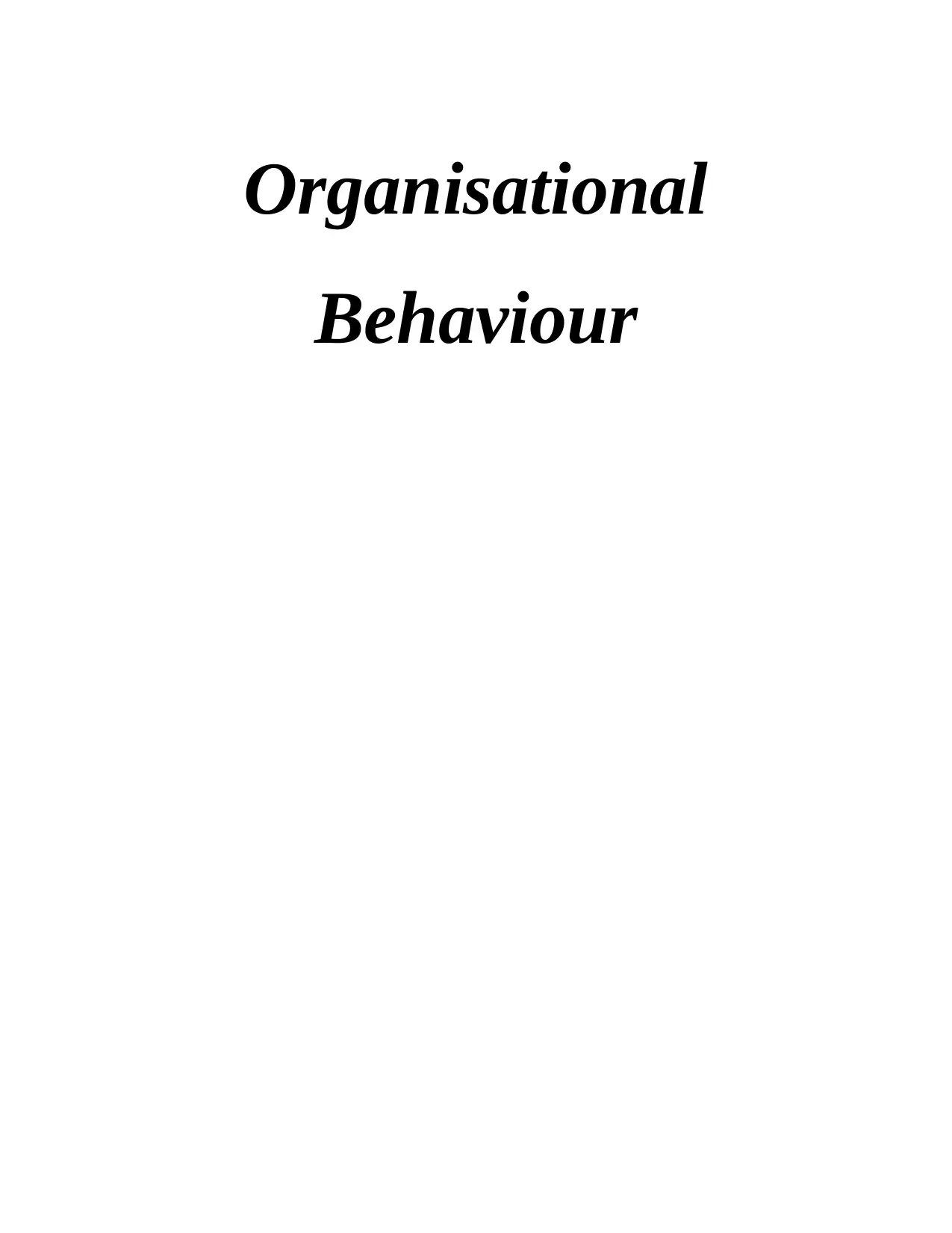
Organisational
Behaviour
Behaviour
Paraphrase This Document
Need a fresh take? Get an instant paraphrase of this document with our AI Paraphraser
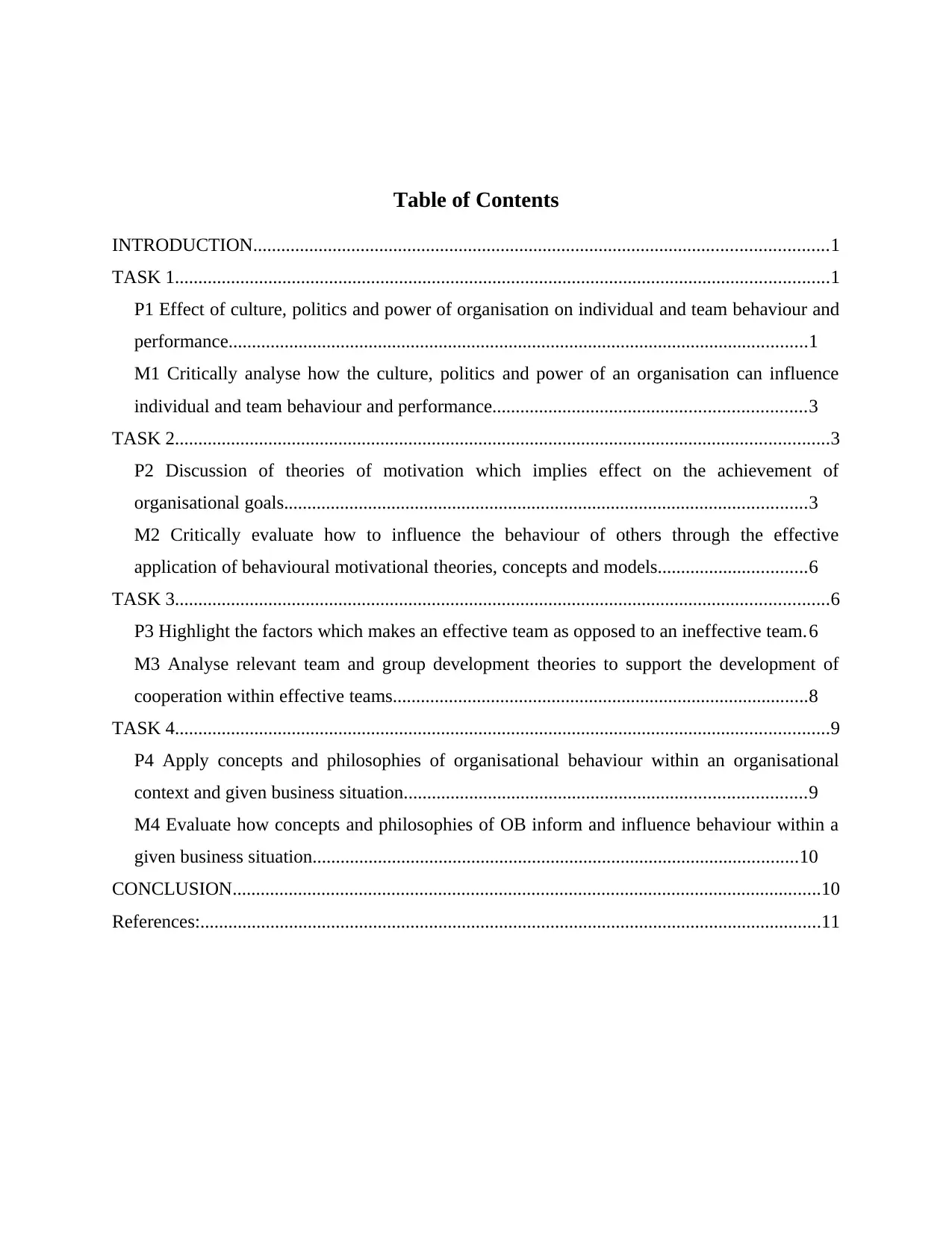
Table of Contents
INTRODUCTION...........................................................................................................................1
TASK 1............................................................................................................................................1
P1 Effect of culture, politics and power of organisation on individual and team behaviour and
performance............................................................................................................................1
M1 Critically analyse how the culture, politics and power of an organisation can influence
individual and team behaviour and performance...................................................................3
TASK 2............................................................................................................................................3
P2 Discussion of theories of motivation which implies effect on the achievement of
organisational goals................................................................................................................3
M2 Critically evaluate how to influence the behaviour of others through the effective
application of behavioural motivational theories, concepts and models................................6
TASK 3............................................................................................................................................6
P3 Highlight the factors which makes an effective team as opposed to an ineffective team.6
M3 Analyse relevant team and group development theories to support the development of
cooperation within effective teams.........................................................................................8
TASK 4............................................................................................................................................9
P4 Apply concepts and philosophies of organisational behaviour within an organisational
context and given business situation......................................................................................9
M4 Evaluate how concepts and philosophies of OB inform and influence behaviour within a
given business situation........................................................................................................10
CONCLUSION..............................................................................................................................10
References:.....................................................................................................................................11
INTRODUCTION...........................................................................................................................1
TASK 1............................................................................................................................................1
P1 Effect of culture, politics and power of organisation on individual and team behaviour and
performance............................................................................................................................1
M1 Critically analyse how the culture, politics and power of an organisation can influence
individual and team behaviour and performance...................................................................3
TASK 2............................................................................................................................................3
P2 Discussion of theories of motivation which implies effect on the achievement of
organisational goals................................................................................................................3
M2 Critically evaluate how to influence the behaviour of others through the effective
application of behavioural motivational theories, concepts and models................................6
TASK 3............................................................................................................................................6
P3 Highlight the factors which makes an effective team as opposed to an ineffective team.6
M3 Analyse relevant team and group development theories to support the development of
cooperation within effective teams.........................................................................................8
TASK 4............................................................................................................................................9
P4 Apply concepts and philosophies of organisational behaviour within an organisational
context and given business situation......................................................................................9
M4 Evaluate how concepts and philosophies of OB inform and influence behaviour within a
given business situation........................................................................................................10
CONCLUSION..............................................................................................................................10
References:.....................................................................................................................................11
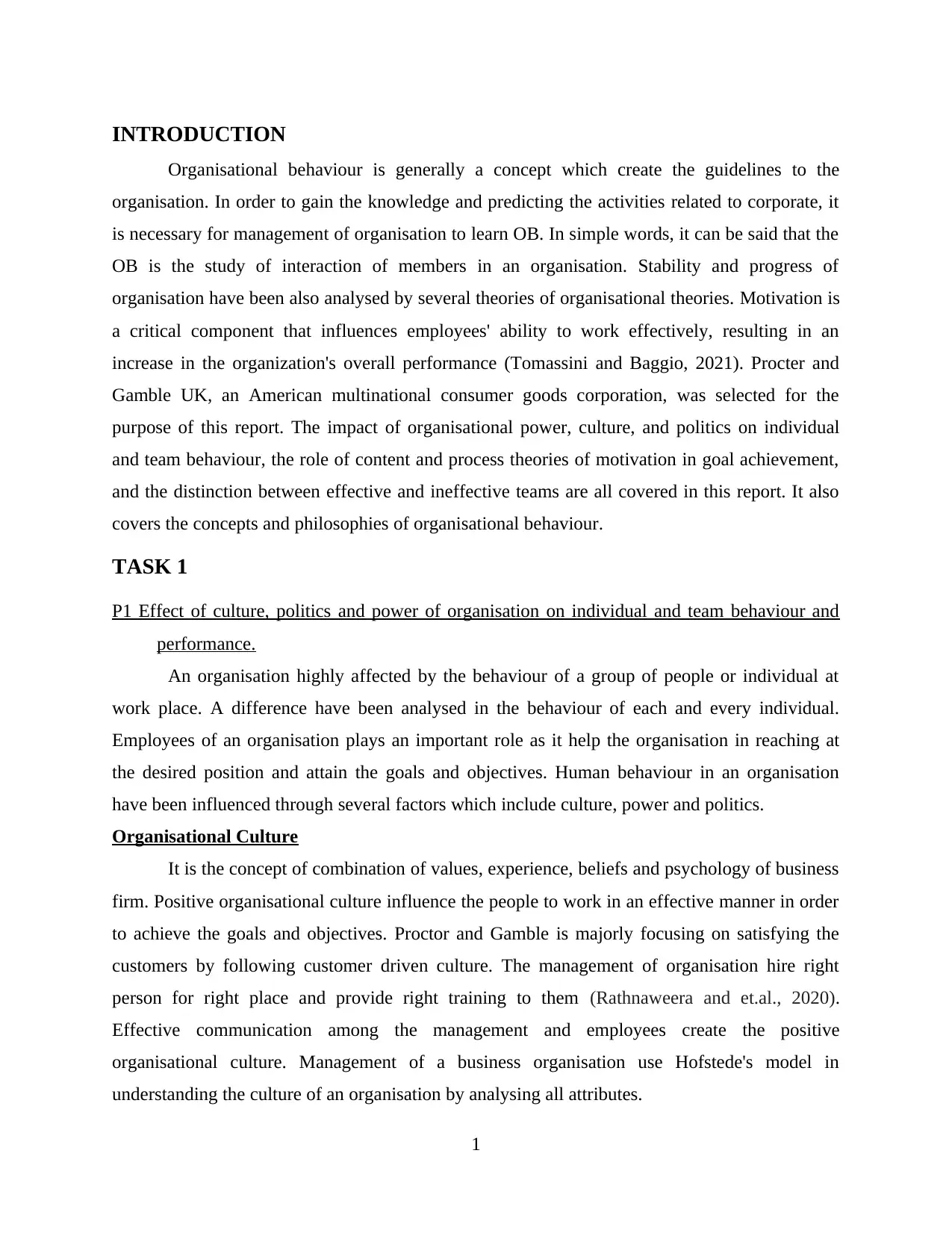
INTRODUCTION
Organisational behaviour is generally a concept which create the guidelines to the
organisation. In order to gain the knowledge and predicting the activities related to corporate, it
is necessary for management of organisation to learn OB. In simple words, it can be said that the
OB is the study of interaction of members in an organisation. Stability and progress of
organisation have been also analysed by several theories of organisational theories. Motivation is
a critical component that influences employees' ability to work effectively, resulting in an
increase in the organization's overall performance (Tomassini and Baggio, 2021). Procter and
Gamble UK, an American multinational consumer goods corporation, was selected for the
purpose of this report. The impact of organisational power, culture, and politics on individual
and team behaviour, the role of content and process theories of motivation in goal achievement,
and the distinction between effective and ineffective teams are all covered in this report. It also
covers the concepts and philosophies of organisational behaviour.
TASK 1
P1 Effect of culture, politics and power of organisation on individual and team behaviour and
performance.
An organisation highly affected by the behaviour of a group of people or individual at
work place. A difference have been analysed in the behaviour of each and every individual.
Employees of an organisation plays an important role as it help the organisation in reaching at
the desired position and attain the goals and objectives. Human behaviour in an organisation
have been influenced through several factors which include culture, power and politics.
Organisational Culture
It is the concept of combination of values, experience, beliefs and psychology of business
firm. Positive organisational culture influence the people to work in an effective manner in order
to achieve the goals and objectives. Proctor and Gamble is majorly focusing on satisfying the
customers by following customer driven culture. The management of organisation hire right
person for right place and provide right training to them (Rathnaweera and et.al., 2020).
Effective communication among the management and employees create the positive
organisational culture. Management of a business organisation use Hofstede's model in
understanding the culture of an organisation by analysing all attributes.
1
Organisational behaviour is generally a concept which create the guidelines to the
organisation. In order to gain the knowledge and predicting the activities related to corporate, it
is necessary for management of organisation to learn OB. In simple words, it can be said that the
OB is the study of interaction of members in an organisation. Stability and progress of
organisation have been also analysed by several theories of organisational theories. Motivation is
a critical component that influences employees' ability to work effectively, resulting in an
increase in the organization's overall performance (Tomassini and Baggio, 2021). Procter and
Gamble UK, an American multinational consumer goods corporation, was selected for the
purpose of this report. The impact of organisational power, culture, and politics on individual
and team behaviour, the role of content and process theories of motivation in goal achievement,
and the distinction between effective and ineffective teams are all covered in this report. It also
covers the concepts and philosophies of organisational behaviour.
TASK 1
P1 Effect of culture, politics and power of organisation on individual and team behaviour and
performance.
An organisation highly affected by the behaviour of a group of people or individual at
work place. A difference have been analysed in the behaviour of each and every individual.
Employees of an organisation plays an important role as it help the organisation in reaching at
the desired position and attain the goals and objectives. Human behaviour in an organisation
have been influenced through several factors which include culture, power and politics.
Organisational Culture
It is the concept of combination of values, experience, beliefs and psychology of business
firm. Positive organisational culture influence the people to work in an effective manner in order
to achieve the goals and objectives. Proctor and Gamble is majorly focusing on satisfying the
customers by following customer driven culture. The management of organisation hire right
person for right place and provide right training to them (Rathnaweera and et.al., 2020).
Effective communication among the management and employees create the positive
organisational culture. Management of a business organisation use Hofstede's model in
understanding the culture of an organisation by analysing all attributes.
1
⊘ This is a preview!⊘
Do you want full access?
Subscribe today to unlock all pages.

Trusted by 1+ million students worldwide
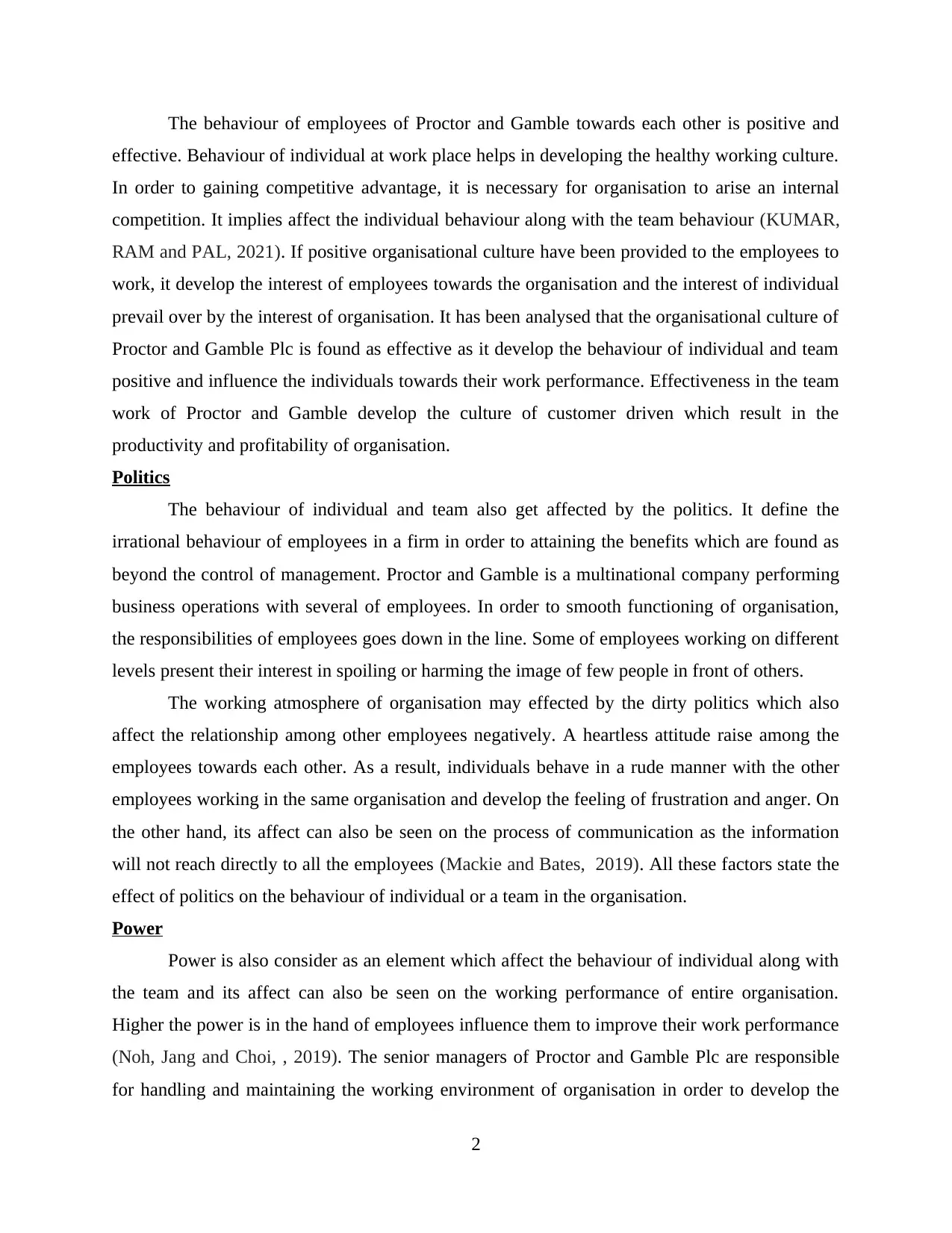
The behaviour of employees of Proctor and Gamble towards each other is positive and
effective. Behaviour of individual at work place helps in developing the healthy working culture.
In order to gaining competitive advantage, it is necessary for organisation to arise an internal
competition. It implies affect the individual behaviour along with the team behaviour (KUMAR,
RAM and PAL, 2021). If positive organisational culture have been provided to the employees to
work, it develop the interest of employees towards the organisation and the interest of individual
prevail over by the interest of organisation. It has been analysed that the organisational culture of
Proctor and Gamble Plc is found as effective as it develop the behaviour of individual and team
positive and influence the individuals towards their work performance. Effectiveness in the team
work of Proctor and Gamble develop the culture of customer driven which result in the
productivity and profitability of organisation.
Politics
The behaviour of individual and team also get affected by the politics. It define the
irrational behaviour of employees in a firm in order to attaining the benefits which are found as
beyond the control of management. Proctor and Gamble is a multinational company performing
business operations with several of employees. In order to smooth functioning of organisation,
the responsibilities of employees goes down in the line. Some of employees working on different
levels present their interest in spoiling or harming the image of few people in front of others.
The working atmosphere of organisation may effected by the dirty politics which also
affect the relationship among other employees negatively. A heartless attitude raise among the
employees towards each other. As a result, individuals behave in a rude manner with the other
employees working in the same organisation and develop the feeling of frustration and anger. On
the other hand, its affect can also be seen on the process of communication as the information
will not reach directly to all the employees (Mackie and Bates, 2019). All these factors state the
effect of politics on the behaviour of individual or a team in the organisation.
Power
Power is also consider as an element which affect the behaviour of individual along with
the team and its affect can also be seen on the working performance of entire organisation.
Higher the power is in the hand of employees influence them to improve their work performance
(Noh, Jang and Choi, , 2019). The senior managers of Proctor and Gamble Plc are responsible
for handling and maintaining the working environment of organisation in order to develop the
2
effective. Behaviour of individual at work place helps in developing the healthy working culture.
In order to gaining competitive advantage, it is necessary for organisation to arise an internal
competition. It implies affect the individual behaviour along with the team behaviour (KUMAR,
RAM and PAL, 2021). If positive organisational culture have been provided to the employees to
work, it develop the interest of employees towards the organisation and the interest of individual
prevail over by the interest of organisation. It has been analysed that the organisational culture of
Proctor and Gamble Plc is found as effective as it develop the behaviour of individual and team
positive and influence the individuals towards their work performance. Effectiveness in the team
work of Proctor and Gamble develop the culture of customer driven which result in the
productivity and profitability of organisation.
Politics
The behaviour of individual and team also get affected by the politics. It define the
irrational behaviour of employees in a firm in order to attaining the benefits which are found as
beyond the control of management. Proctor and Gamble is a multinational company performing
business operations with several of employees. In order to smooth functioning of organisation,
the responsibilities of employees goes down in the line. Some of employees working on different
levels present their interest in spoiling or harming the image of few people in front of others.
The working atmosphere of organisation may effected by the dirty politics which also
affect the relationship among other employees negatively. A heartless attitude raise among the
employees towards each other. As a result, individuals behave in a rude manner with the other
employees working in the same organisation and develop the feeling of frustration and anger. On
the other hand, its affect can also be seen on the process of communication as the information
will not reach directly to all the employees (Mackie and Bates, 2019). All these factors state the
effect of politics on the behaviour of individual or a team in the organisation.
Power
Power is also consider as an element which affect the behaviour of individual along with
the team and its affect can also be seen on the working performance of entire organisation.
Higher the power is in the hand of employees influence them to improve their work performance
(Noh, Jang and Choi, , 2019). The senior managers of Proctor and Gamble Plc are responsible
for handling and maintaining the working environment of organisation in order to develop the
2
Paraphrase This Document
Need a fresh take? Get an instant paraphrase of this document with our AI Paraphraser
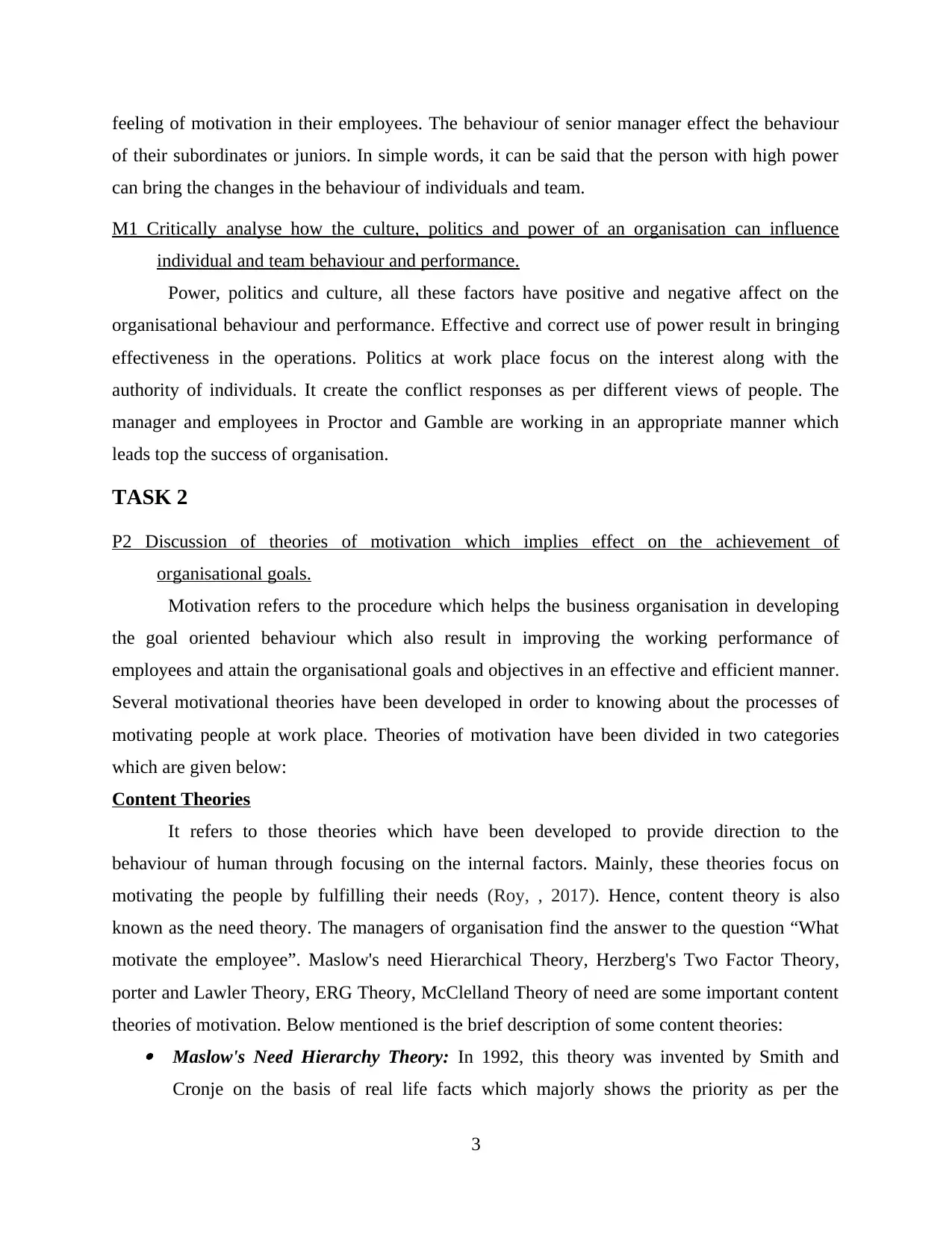
feeling of motivation in their employees. The behaviour of senior manager effect the behaviour
of their subordinates or juniors. In simple words, it can be said that the person with high power
can bring the changes in the behaviour of individuals and team.
M1 Critically analyse how the culture, politics and power of an organisation can influence
individual and team behaviour and performance.
Power, politics and culture, all these factors have positive and negative affect on the
organisational behaviour and performance. Effective and correct use of power result in bringing
effectiveness in the operations. Politics at work place focus on the interest along with the
authority of individuals. It create the conflict responses as per different views of people. The
manager and employees in Proctor and Gamble are working in an appropriate manner which
leads top the success of organisation.
TASK 2
P2 Discussion of theories of motivation which implies effect on the achievement of
organisational goals.
Motivation refers to the procedure which helps the business organisation in developing
the goal oriented behaviour which also result in improving the working performance of
employees and attain the organisational goals and objectives in an effective and efficient manner.
Several motivational theories have been developed in order to knowing about the processes of
motivating people at work place. Theories of motivation have been divided in two categories
which are given below:
Content Theories
It refers to those theories which have been developed to provide direction to the
behaviour of human through focusing on the internal factors. Mainly, these theories focus on
motivating the people by fulfilling their needs (Roy, , 2017). Hence, content theory is also
known as the need theory. The managers of organisation find the answer to the question “What
motivate the employee”. Maslow's need Hierarchical Theory, Herzberg's Two Factor Theory,
porter and Lawler Theory, ERG Theory, McClelland Theory of need are some important content
theories of motivation. Below mentioned is the brief description of some content theories: Maslow's Need Hierarchy Theory: In 1992, this theory was invented by Smith and
Cronje on the basis of real life facts which majorly shows the priority as per the
3
of their subordinates or juniors. In simple words, it can be said that the person with high power
can bring the changes in the behaviour of individuals and team.
M1 Critically analyse how the culture, politics and power of an organisation can influence
individual and team behaviour and performance.
Power, politics and culture, all these factors have positive and negative affect on the
organisational behaviour and performance. Effective and correct use of power result in bringing
effectiveness in the operations. Politics at work place focus on the interest along with the
authority of individuals. It create the conflict responses as per different views of people. The
manager and employees in Proctor and Gamble are working in an appropriate manner which
leads top the success of organisation.
TASK 2
P2 Discussion of theories of motivation which implies effect on the achievement of
organisational goals.
Motivation refers to the procedure which helps the business organisation in developing
the goal oriented behaviour which also result in improving the working performance of
employees and attain the organisational goals and objectives in an effective and efficient manner.
Several motivational theories have been developed in order to knowing about the processes of
motivating people at work place. Theories of motivation have been divided in two categories
which are given below:
Content Theories
It refers to those theories which have been developed to provide direction to the
behaviour of human through focusing on the internal factors. Mainly, these theories focus on
motivating the people by fulfilling their needs (Roy, , 2017). Hence, content theory is also
known as the need theory. The managers of organisation find the answer to the question “What
motivate the employee”. Maslow's need Hierarchical Theory, Herzberg's Two Factor Theory,
porter and Lawler Theory, ERG Theory, McClelland Theory of need are some important content
theories of motivation. Below mentioned is the brief description of some content theories: Maslow's Need Hierarchy Theory: In 1992, this theory was invented by Smith and
Cronje on the basis of real life facts which majorly shows the priority as per the
3
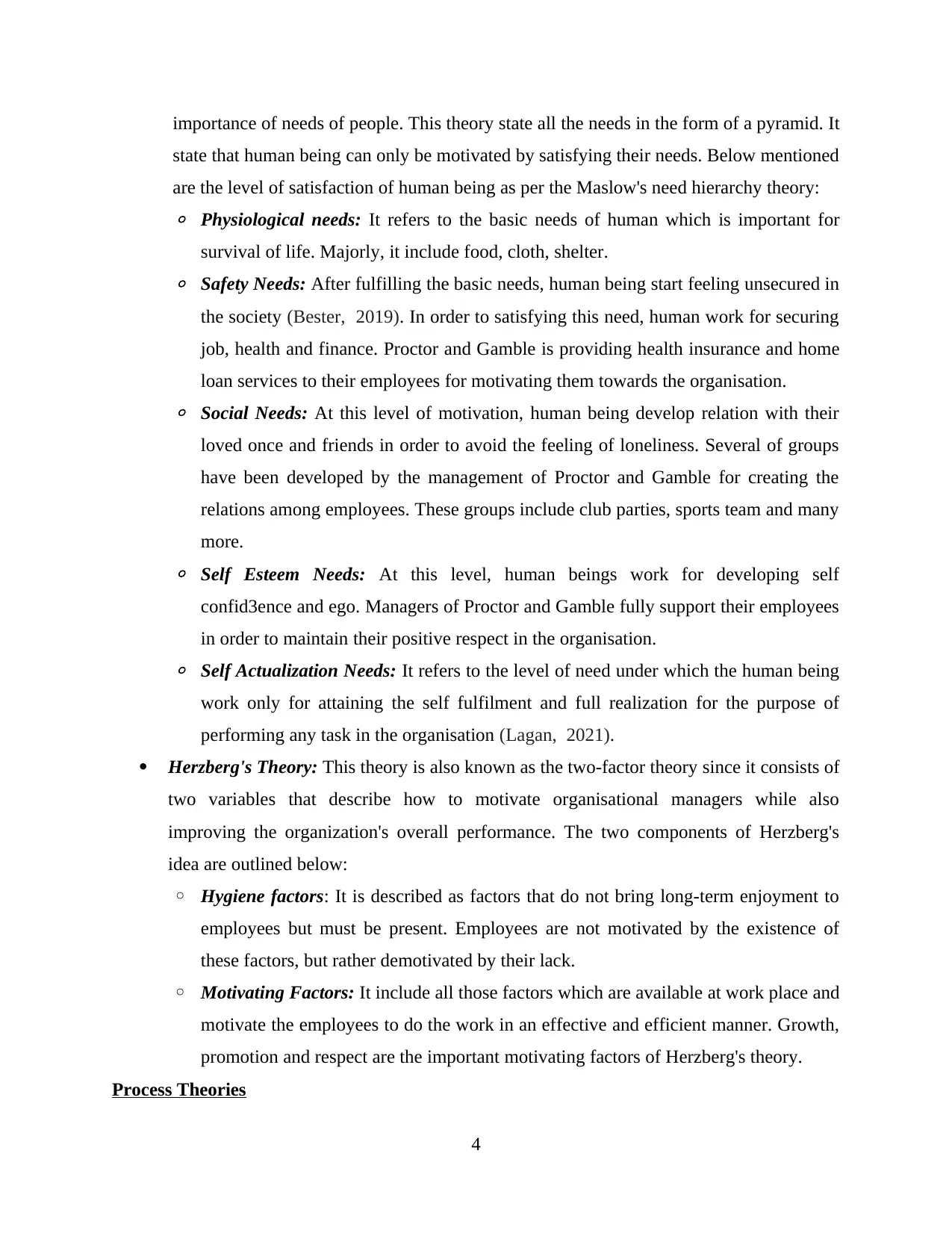
importance of needs of people. This theory state all the needs in the form of a pyramid. It
state that human being can only be motivated by satisfying their needs. Below mentioned
are the level of satisfaction of human being as per the Maslow's need hierarchy theory:
◦ Physiological needs: It refers to the basic needs of human which is important for
survival of life. Majorly, it include food, cloth, shelter.
◦ Safety Needs: After fulfilling the basic needs, human being start feeling unsecured in
the society (Bester, 2019). In order to satisfying this need, human work for securing
job, health and finance. Proctor and Gamble is providing health insurance and home
loan services to their employees for motivating them towards the organisation.
◦ Social Needs: At this level of motivation, human being develop relation with their
loved once and friends in order to avoid the feeling of loneliness. Several of groups
have been developed by the management of Proctor and Gamble for creating the
relations among employees. These groups include club parties, sports team and many
more.
◦ Self Esteem Needs: At this level, human beings work for developing self
confid3ence and ego. Managers of Proctor and Gamble fully support their employees
in order to maintain their positive respect in the organisation.
◦ Self Actualization Needs: It refers to the level of need under which the human being
work only for attaining the self fulfilment and full realization for the purpose of
performing any task in the organisation (Lagan, 2021).
Herzberg's Theory: This theory is also known as the two-factor theory since it consists of
two variables that describe how to motivate organisational managers while also
improving the organization's overall performance. The two components of Herzberg's
idea are outlined below:
◦ Hygiene factors: It is described as factors that do not bring long-term enjoyment to
employees but must be present. Employees are not motivated by the existence of
these factors, but rather demotivated by their lack.
◦ Motivating Factors: It include all those factors which are available at work place and
motivate the employees to do the work in an effective and efficient manner. Growth,
promotion and respect are the important motivating factors of Herzberg's theory.
Process Theories
4
state that human being can only be motivated by satisfying their needs. Below mentioned
are the level of satisfaction of human being as per the Maslow's need hierarchy theory:
◦ Physiological needs: It refers to the basic needs of human which is important for
survival of life. Majorly, it include food, cloth, shelter.
◦ Safety Needs: After fulfilling the basic needs, human being start feeling unsecured in
the society (Bester, 2019). In order to satisfying this need, human work for securing
job, health and finance. Proctor and Gamble is providing health insurance and home
loan services to their employees for motivating them towards the organisation.
◦ Social Needs: At this level of motivation, human being develop relation with their
loved once and friends in order to avoid the feeling of loneliness. Several of groups
have been developed by the management of Proctor and Gamble for creating the
relations among employees. These groups include club parties, sports team and many
more.
◦ Self Esteem Needs: At this level, human beings work for developing self
confid3ence and ego. Managers of Proctor and Gamble fully support their employees
in order to maintain their positive respect in the organisation.
◦ Self Actualization Needs: It refers to the level of need under which the human being
work only for attaining the self fulfilment and full realization for the purpose of
performing any task in the organisation (Lagan, 2021).
Herzberg's Theory: This theory is also known as the two-factor theory since it consists of
two variables that describe how to motivate organisational managers while also
improving the organization's overall performance. The two components of Herzberg's
idea are outlined below:
◦ Hygiene factors: It is described as factors that do not bring long-term enjoyment to
employees but must be present. Employees are not motivated by the existence of
these factors, but rather demotivated by their lack.
◦ Motivating Factors: It include all those factors which are available at work place and
motivate the employees to do the work in an effective and efficient manner. Growth,
promotion and respect are the important motivating factors of Herzberg's theory.
Process Theories
4
⊘ This is a preview!⊘
Do you want full access?
Subscribe today to unlock all pages.

Trusted by 1+ million students worldwide
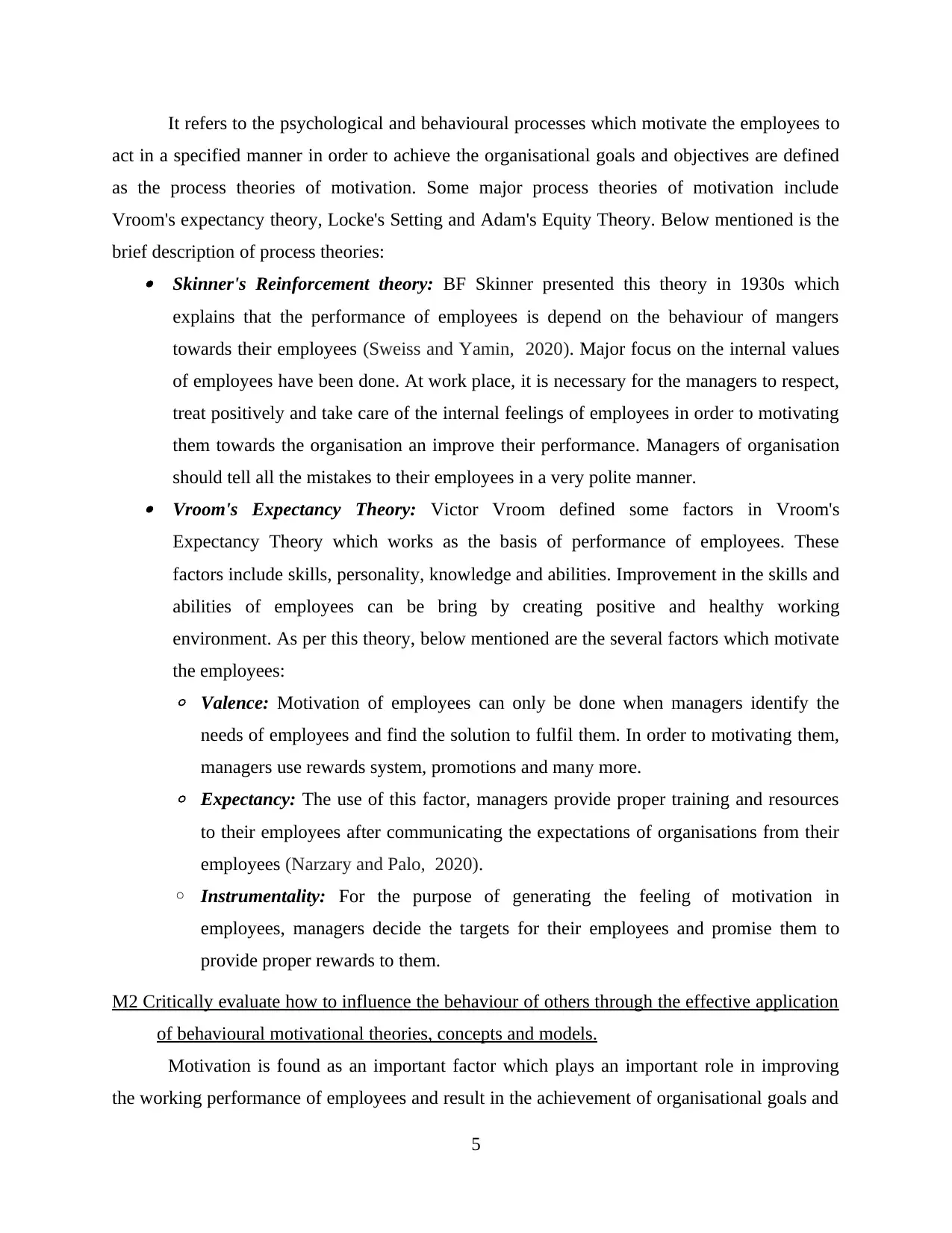
It refers to the psychological and behavioural processes which motivate the employees to
act in a specified manner in order to achieve the organisational goals and objectives are defined
as the process theories of motivation. Some major process theories of motivation include
Vroom's expectancy theory, Locke's Setting and Adam's Equity Theory. Below mentioned is the
brief description of process theories: Skinner's Reinforcement theory: BF Skinner presented this theory in 1930s which
explains that the performance of employees is depend on the behaviour of mangers
towards their employees (Sweiss and Yamin, 2020). Major focus on the internal values
of employees have been done. At work place, it is necessary for the managers to respect,
treat positively and take care of the internal feelings of employees in order to motivating
them towards the organisation an improve their performance. Managers of organisation
should tell all the mistakes to their employees in a very polite manner. Vroom's Expectancy Theory: Victor Vroom defined some factors in Vroom's
Expectancy Theory which works as the basis of performance of employees. These
factors include skills, personality, knowledge and abilities. Improvement in the skills and
abilities of employees can be bring by creating positive and healthy working
environment. As per this theory, below mentioned are the several factors which motivate
the employees:
◦ Valence: Motivation of employees can only be done when managers identify the
needs of employees and find the solution to fulfil them. In order to motivating them,
managers use rewards system, promotions and many more.
◦ Expectancy: The use of this factor, managers provide proper training and resources
to their employees after communicating the expectations of organisations from their
employees (Narzary and Palo, 2020).
◦ Instrumentality: For the purpose of generating the feeling of motivation in
employees, managers decide the targets for their employees and promise them to
provide proper rewards to them.
M2 Critically evaluate how to influence the behaviour of others through the effective application
of behavioural motivational theories, concepts and models.
Motivation is found as an important factor which plays an important role in improving
the working performance of employees and result in the achievement of organisational goals and
5
act in a specified manner in order to achieve the organisational goals and objectives are defined
as the process theories of motivation. Some major process theories of motivation include
Vroom's expectancy theory, Locke's Setting and Adam's Equity Theory. Below mentioned is the
brief description of process theories: Skinner's Reinforcement theory: BF Skinner presented this theory in 1930s which
explains that the performance of employees is depend on the behaviour of mangers
towards their employees (Sweiss and Yamin, 2020). Major focus on the internal values
of employees have been done. At work place, it is necessary for the managers to respect,
treat positively and take care of the internal feelings of employees in order to motivating
them towards the organisation an improve their performance. Managers of organisation
should tell all the mistakes to their employees in a very polite manner. Vroom's Expectancy Theory: Victor Vroom defined some factors in Vroom's
Expectancy Theory which works as the basis of performance of employees. These
factors include skills, personality, knowledge and abilities. Improvement in the skills and
abilities of employees can be bring by creating positive and healthy working
environment. As per this theory, below mentioned are the several factors which motivate
the employees:
◦ Valence: Motivation of employees can only be done when managers identify the
needs of employees and find the solution to fulfil them. In order to motivating them,
managers use rewards system, promotions and many more.
◦ Expectancy: The use of this factor, managers provide proper training and resources
to their employees after communicating the expectations of organisations from their
employees (Narzary and Palo, 2020).
◦ Instrumentality: For the purpose of generating the feeling of motivation in
employees, managers decide the targets for their employees and promise them to
provide proper rewards to them.
M2 Critically evaluate how to influence the behaviour of others through the effective application
of behavioural motivational theories, concepts and models.
Motivation is found as an important factor which plays an important role in improving
the working performance of employees and result in the achievement of organisational goals and
5
Paraphrase This Document
Need a fresh take? Get an instant paraphrase of this document with our AI Paraphraser
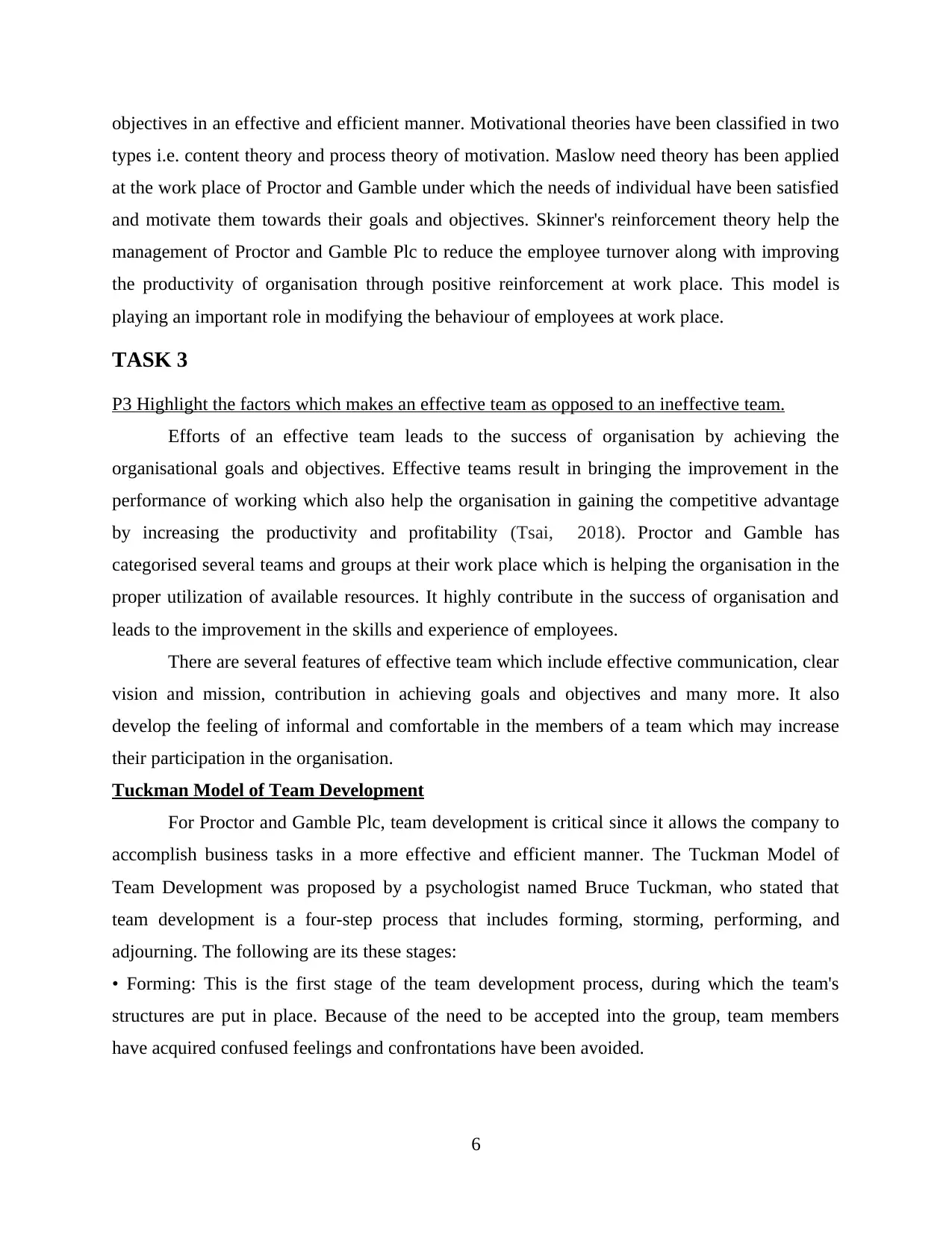
objectives in an effective and efficient manner. Motivational theories have been classified in two
types i.e. content theory and process theory of motivation. Maslow need theory has been applied
at the work place of Proctor and Gamble under which the needs of individual have been satisfied
and motivate them towards their goals and objectives. Skinner's reinforcement theory help the
management of Proctor and Gamble Plc to reduce the employee turnover along with improving
the productivity of organisation through positive reinforcement at work place. This model is
playing an important role in modifying the behaviour of employees at work place.
TASK 3
P3 Highlight the factors which makes an effective team as opposed to an ineffective team.
Efforts of an effective team leads to the success of organisation by achieving the
organisational goals and objectives. Effective teams result in bringing the improvement in the
performance of working which also help the organisation in gaining the competitive advantage
by increasing the productivity and profitability (Tsai, 2018). Proctor and Gamble has
categorised several teams and groups at their work place which is helping the organisation in the
proper utilization of available resources. It highly contribute in the success of organisation and
leads to the improvement in the skills and experience of employees.
There are several features of effective team which include effective communication, clear
vision and mission, contribution in achieving goals and objectives and many more. It also
develop the feeling of informal and comfortable in the members of a team which may increase
their participation in the organisation.
Tuckman Model of Team Development
For Proctor and Gamble Plc, team development is critical since it allows the company to
accomplish business tasks in a more effective and efficient manner. The Tuckman Model of
Team Development was proposed by a psychologist named Bruce Tuckman, who stated that
team development is a four-step process that includes forming, storming, performing, and
adjourning. The following are its these stages:
• Forming: This is the first stage of the team development process, during which the team's
structures are put in place. Because of the need to be accepted into the group, team members
have acquired confused feelings and confrontations have been avoided.
6
types i.e. content theory and process theory of motivation. Maslow need theory has been applied
at the work place of Proctor and Gamble under which the needs of individual have been satisfied
and motivate them towards their goals and objectives. Skinner's reinforcement theory help the
management of Proctor and Gamble Plc to reduce the employee turnover along with improving
the productivity of organisation through positive reinforcement at work place. This model is
playing an important role in modifying the behaviour of employees at work place.
TASK 3
P3 Highlight the factors which makes an effective team as opposed to an ineffective team.
Efforts of an effective team leads to the success of organisation by achieving the
organisational goals and objectives. Effective teams result in bringing the improvement in the
performance of working which also help the organisation in gaining the competitive advantage
by increasing the productivity and profitability (Tsai, 2018). Proctor and Gamble has
categorised several teams and groups at their work place which is helping the organisation in the
proper utilization of available resources. It highly contribute in the success of organisation and
leads to the improvement in the skills and experience of employees.
There are several features of effective team which include effective communication, clear
vision and mission, contribution in achieving goals and objectives and many more. It also
develop the feeling of informal and comfortable in the members of a team which may increase
their participation in the organisation.
Tuckman Model of Team Development
For Proctor and Gamble Plc, team development is critical since it allows the company to
accomplish business tasks in a more effective and efficient manner. The Tuckman Model of
Team Development was proposed by a psychologist named Bruce Tuckman, who stated that
team development is a four-step process that includes forming, storming, performing, and
adjourning. The following are its these stages:
• Forming: This is the first stage of the team development process, during which the team's
structures are put in place. Because of the need to be accepted into the group, team members
have acquired confused feelings and confrontations have been avoided.
6
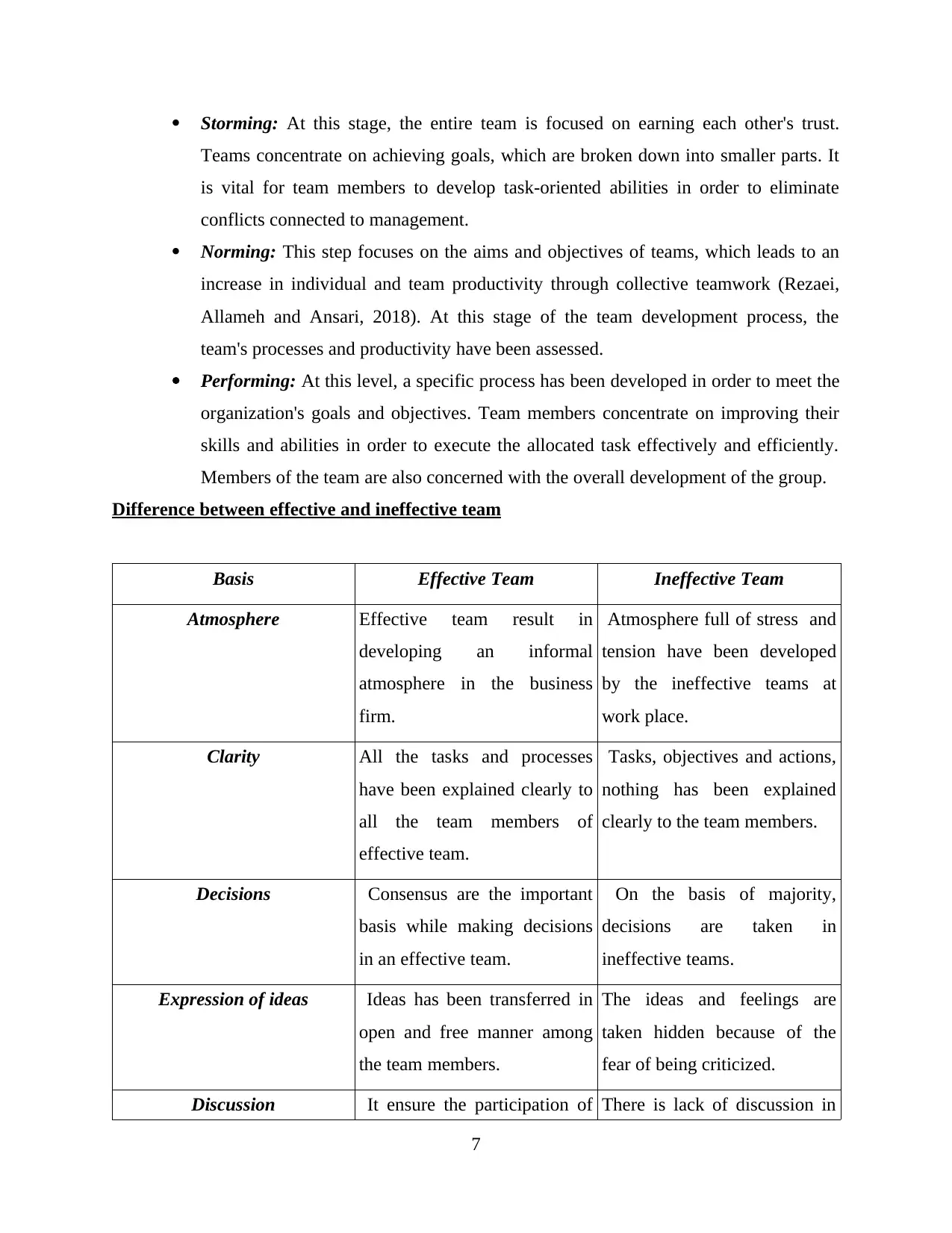
Storming: At this stage, the entire team is focused on earning each other's trust.
Teams concentrate on achieving goals, which are broken down into smaller parts. It
is vital for team members to develop task-oriented abilities in order to eliminate
conflicts connected to management.
Norming: This step focuses on the aims and objectives of teams, which leads to an
increase in individual and team productivity through collective teamwork (Rezaei,
Allameh and Ansari, 2018). At this stage of the team development process, the
team's processes and productivity have been assessed.
Performing: At this level, a specific process has been developed in order to meet the
organization's goals and objectives. Team members concentrate on improving their
skills and abilities in order to execute the allocated task effectively and efficiently.
Members of the team are also concerned with the overall development of the group.
Difference between effective and ineffective team
Basis Effective Team Ineffective Team
Atmosphere Effective team result in
developing an informal
atmosphere in the business
firm.
Atmosphere full of stress and
tension have been developed
by the ineffective teams at
work place.
Clarity All the tasks and processes
have been explained clearly to
all the team members of
effective team.
Tasks, objectives and actions,
nothing has been explained
clearly to the team members.
Decisions Consensus are the important
basis while making decisions
in an effective team.
On the basis of majority,
decisions are taken in
ineffective teams.
Expression of ideas Ideas has been transferred in
open and free manner among
the team members.
The ideas and feelings are
taken hidden because of the
fear of being criticized.
Discussion It ensure the participation of There is lack of discussion in
7
Teams concentrate on achieving goals, which are broken down into smaller parts. It
is vital for team members to develop task-oriented abilities in order to eliminate
conflicts connected to management.
Norming: This step focuses on the aims and objectives of teams, which leads to an
increase in individual and team productivity through collective teamwork (Rezaei,
Allameh and Ansari, 2018). At this stage of the team development process, the
team's processes and productivity have been assessed.
Performing: At this level, a specific process has been developed in order to meet the
organization's goals and objectives. Team members concentrate on improving their
skills and abilities in order to execute the allocated task effectively and efficiently.
Members of the team are also concerned with the overall development of the group.
Difference between effective and ineffective team
Basis Effective Team Ineffective Team
Atmosphere Effective team result in
developing an informal
atmosphere in the business
firm.
Atmosphere full of stress and
tension have been developed
by the ineffective teams at
work place.
Clarity All the tasks and processes
have been explained clearly to
all the team members of
effective team.
Tasks, objectives and actions,
nothing has been explained
clearly to the team members.
Decisions Consensus are the important
basis while making decisions
in an effective team.
On the basis of majority,
decisions are taken in
ineffective teams.
Expression of ideas Ideas has been transferred in
open and free manner among
the team members.
The ideas and feelings are
taken hidden because of the
fear of being criticized.
Discussion It ensure the participation of There is lack of discussion in
7
⊘ This is a preview!⊘
Do you want full access?
Subscribe today to unlock all pages.

Trusted by 1+ million students worldwide
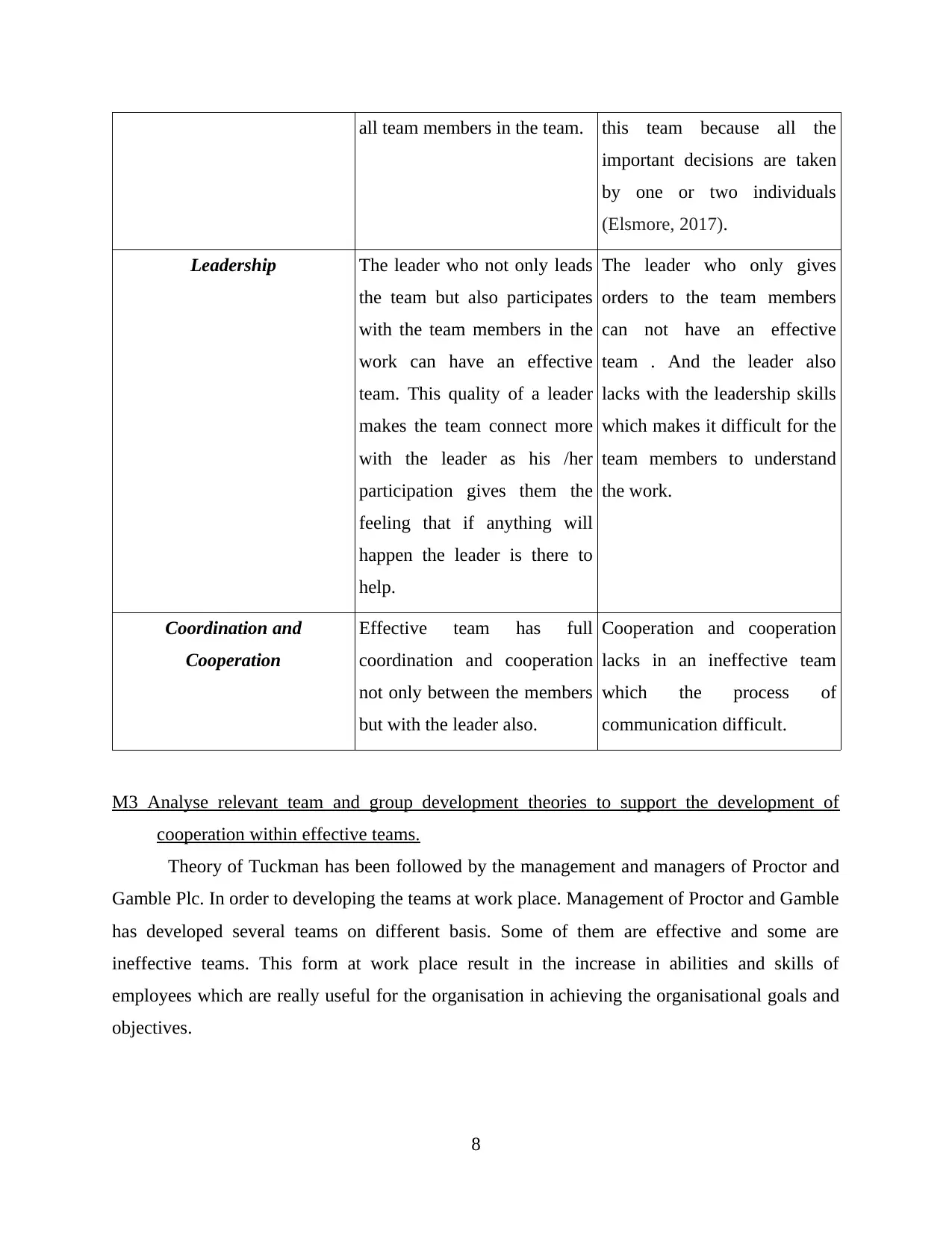
all team members in the team. this team because all the
important decisions are taken
by one or two individuals
(Elsmore, 2017).
Leadership The leader who not only leads
the team but also participates
with the team members in the
work can have an effective
team. This quality of a leader
makes the team connect more
with the leader as his /her
participation gives them the
feeling that if anything will
happen the leader is there to
help.
The leader who only gives
orders to the team members
can not have an effective
team . And the leader also
lacks with the leadership skills
which makes it difficult for the
team members to understand
the work.
Coordination and
Cooperation
Effective team has full
coordination and cooperation
not only between the members
but with the leader also.
Cooperation and cooperation
lacks in an ineffective team
which the process of
communication difficult.
M3 Analyse relevant team and group development theories to support the development of
cooperation within effective teams.
Theory of Tuckman has been followed by the management and managers of Proctor and
Gamble Plc. In order to developing the teams at work place. Management of Proctor and Gamble
has developed several teams on different basis. Some of them are effective and some are
ineffective teams. This form at work place result in the increase in abilities and skills of
employees which are really useful for the organisation in achieving the organisational goals and
objectives.
8
important decisions are taken
by one or two individuals
(Elsmore, 2017).
Leadership The leader who not only leads
the team but also participates
with the team members in the
work can have an effective
team. This quality of a leader
makes the team connect more
with the leader as his /her
participation gives them the
feeling that if anything will
happen the leader is there to
help.
The leader who only gives
orders to the team members
can not have an effective
team . And the leader also
lacks with the leadership skills
which makes it difficult for the
team members to understand
the work.
Coordination and
Cooperation
Effective team has full
coordination and cooperation
not only between the members
but with the leader also.
Cooperation and cooperation
lacks in an ineffective team
which the process of
communication difficult.
M3 Analyse relevant team and group development theories to support the development of
cooperation within effective teams.
Theory of Tuckman has been followed by the management and managers of Proctor and
Gamble Plc. In order to developing the teams at work place. Management of Proctor and Gamble
has developed several teams on different basis. Some of them are effective and some are
ineffective teams. This form at work place result in the increase in abilities and skills of
employees which are really useful for the organisation in achieving the organisational goals and
objectives.
8
Paraphrase This Document
Need a fresh take? Get an instant paraphrase of this document with our AI Paraphraser
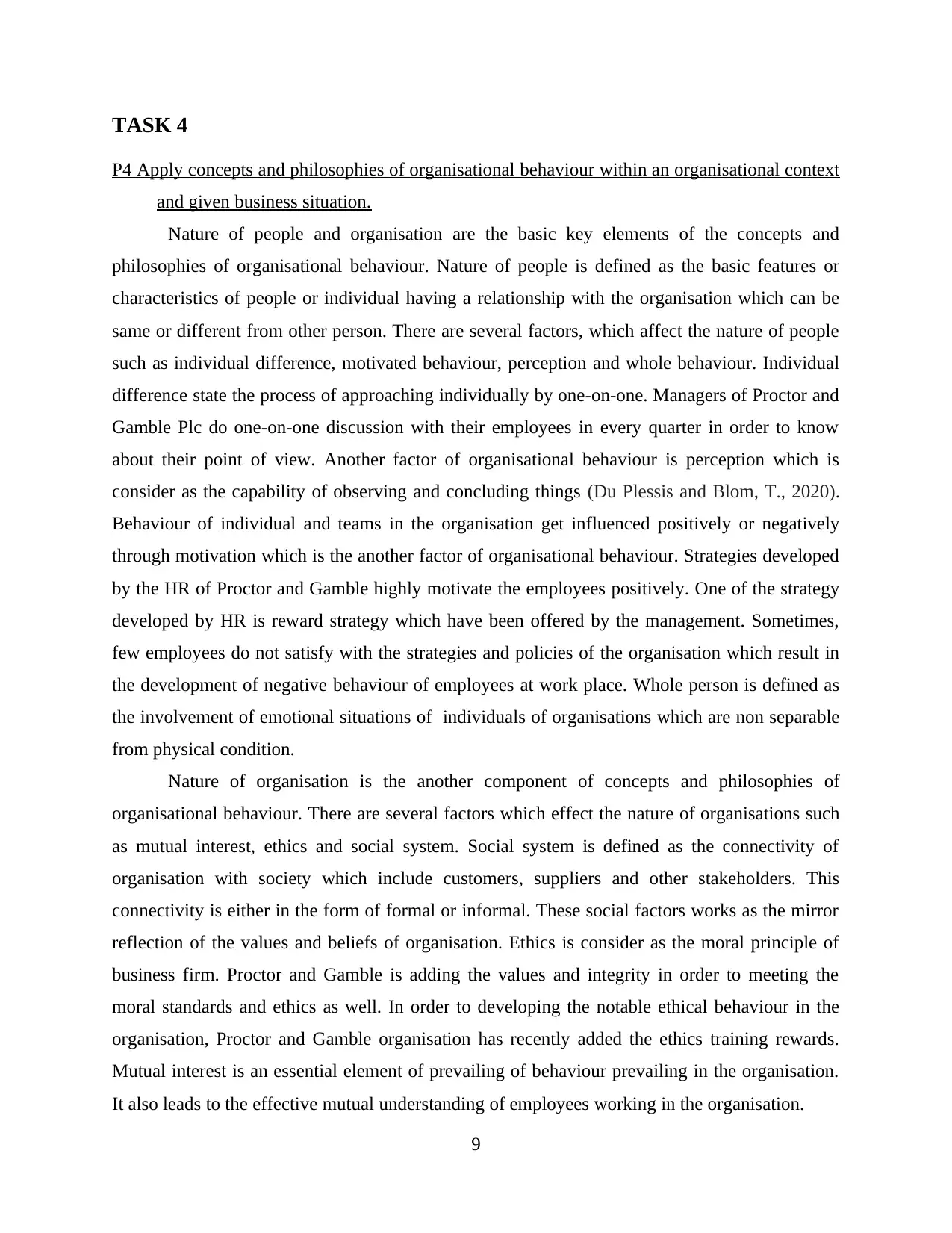
TASK 4
P4 Apply concepts and philosophies of organisational behaviour within an organisational context
and given business situation.
Nature of people and organisation are the basic key elements of the concepts and
philosophies of organisational behaviour. Nature of people is defined as the basic features or
characteristics of people or individual having a relationship with the organisation which can be
same or different from other person. There are several factors, which affect the nature of people
such as individual difference, motivated behaviour, perception and whole behaviour. Individual
difference state the process of approaching individually by one-on-one. Managers of Proctor and
Gamble Plc do one-on-one discussion with their employees in every quarter in order to know
about their point of view. Another factor of organisational behaviour is perception which is
consider as the capability of observing and concluding things (Du Plessis and Blom, T., 2020).
Behaviour of individual and teams in the organisation get influenced positively or negatively
through motivation which is the another factor of organisational behaviour. Strategies developed
by the HR of Proctor and Gamble highly motivate the employees positively. One of the strategy
developed by HR is reward strategy which have been offered by the management. Sometimes,
few employees do not satisfy with the strategies and policies of the organisation which result in
the development of negative behaviour of employees at work place. Whole person is defined as
the involvement of emotional situations of individuals of organisations which are non separable
from physical condition.
Nature of organisation is the another component of concepts and philosophies of
organisational behaviour. There are several factors which effect the nature of organisations such
as mutual interest, ethics and social system. Social system is defined as the connectivity of
organisation with society which include customers, suppliers and other stakeholders. This
connectivity is either in the form of formal or informal. These social factors works as the mirror
reflection of the values and beliefs of organisation. Ethics is consider as the moral principle of
business firm. Proctor and Gamble is adding the values and integrity in order to meeting the
moral standards and ethics as well. In order to developing the notable ethical behaviour in the
organisation, Proctor and Gamble organisation has recently added the ethics training rewards.
Mutual interest is an essential element of prevailing of behaviour prevailing in the organisation.
It also leads to the effective mutual understanding of employees working in the organisation.
9
P4 Apply concepts and philosophies of organisational behaviour within an organisational context
and given business situation.
Nature of people and organisation are the basic key elements of the concepts and
philosophies of organisational behaviour. Nature of people is defined as the basic features or
characteristics of people or individual having a relationship with the organisation which can be
same or different from other person. There are several factors, which affect the nature of people
such as individual difference, motivated behaviour, perception and whole behaviour. Individual
difference state the process of approaching individually by one-on-one. Managers of Proctor and
Gamble Plc do one-on-one discussion with their employees in every quarter in order to know
about their point of view. Another factor of organisational behaviour is perception which is
consider as the capability of observing and concluding things (Du Plessis and Blom, T., 2020).
Behaviour of individual and teams in the organisation get influenced positively or negatively
through motivation which is the another factor of organisational behaviour. Strategies developed
by the HR of Proctor and Gamble highly motivate the employees positively. One of the strategy
developed by HR is reward strategy which have been offered by the management. Sometimes,
few employees do not satisfy with the strategies and policies of the organisation which result in
the development of negative behaviour of employees at work place. Whole person is defined as
the involvement of emotional situations of individuals of organisations which are non separable
from physical condition.
Nature of organisation is the another component of concepts and philosophies of
organisational behaviour. There are several factors which effect the nature of organisations such
as mutual interest, ethics and social system. Social system is defined as the connectivity of
organisation with society which include customers, suppliers and other stakeholders. This
connectivity is either in the form of formal or informal. These social factors works as the mirror
reflection of the values and beliefs of organisation. Ethics is consider as the moral principle of
business firm. Proctor and Gamble is adding the values and integrity in order to meeting the
moral standards and ethics as well. In order to developing the notable ethical behaviour in the
organisation, Proctor and Gamble organisation has recently added the ethics training rewards.
Mutual interest is an essential element of prevailing of behaviour prevailing in the organisation.
It also leads to the effective mutual understanding of employees working in the organisation.
9
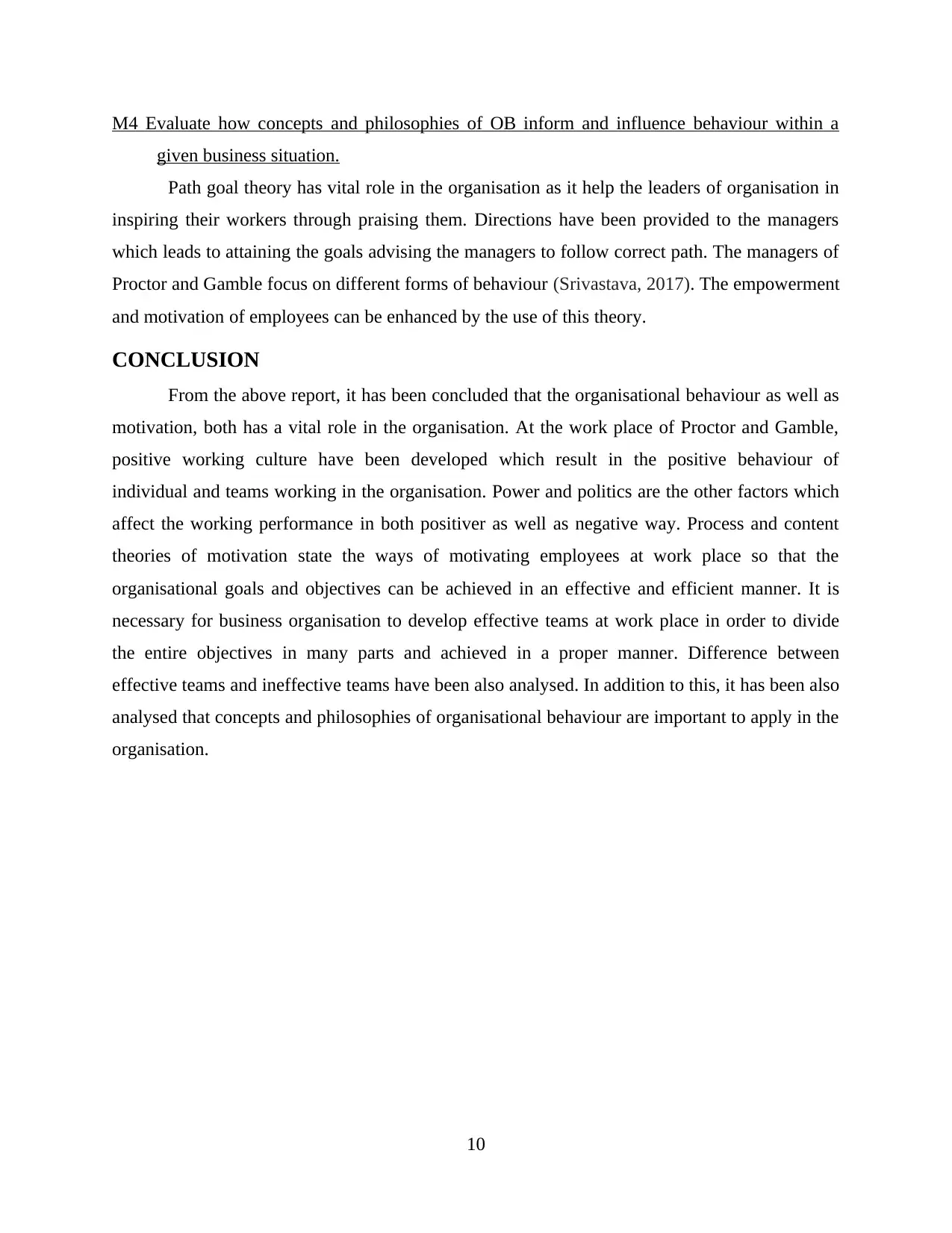
M4 Evaluate how concepts and philosophies of OB inform and influence behaviour within a
given business situation.
Path goal theory has vital role in the organisation as it help the leaders of organisation in
inspiring their workers through praising them. Directions have been provided to the managers
which leads to attaining the goals advising the managers to follow correct path. The managers of
Proctor and Gamble focus on different forms of behaviour (Srivastava, 2017). The empowerment
and motivation of employees can be enhanced by the use of this theory.
CONCLUSION
From the above report, it has been concluded that the organisational behaviour as well as
motivation, both has a vital role in the organisation. At the work place of Proctor and Gamble,
positive working culture have been developed which result in the positive behaviour of
individual and teams working in the organisation. Power and politics are the other factors which
affect the working performance in both positiver as well as negative way. Process and content
theories of motivation state the ways of motivating employees at work place so that the
organisational goals and objectives can be achieved in an effective and efficient manner. It is
necessary for business organisation to develop effective teams at work place in order to divide
the entire objectives in many parts and achieved in a proper manner. Difference between
effective teams and ineffective teams have been also analysed. In addition to this, it has been also
analysed that concepts and philosophies of organisational behaviour are important to apply in the
organisation.
10
given business situation.
Path goal theory has vital role in the organisation as it help the leaders of organisation in
inspiring their workers through praising them. Directions have been provided to the managers
which leads to attaining the goals advising the managers to follow correct path. The managers of
Proctor and Gamble focus on different forms of behaviour (Srivastava, 2017). The empowerment
and motivation of employees can be enhanced by the use of this theory.
CONCLUSION
From the above report, it has been concluded that the organisational behaviour as well as
motivation, both has a vital role in the organisation. At the work place of Proctor and Gamble,
positive working culture have been developed which result in the positive behaviour of
individual and teams working in the organisation. Power and politics are the other factors which
affect the working performance in both positiver as well as negative way. Process and content
theories of motivation state the ways of motivating employees at work place so that the
organisational goals and objectives can be achieved in an effective and efficient manner. It is
necessary for business organisation to develop effective teams at work place in order to divide
the entire objectives in many parts and achieved in a proper manner. Difference between
effective teams and ineffective teams have been also analysed. In addition to this, it has been also
analysed that concepts and philosophies of organisational behaviour are important to apply in the
organisation.
10
⊘ This is a preview!⊘
Do you want full access?
Subscribe today to unlock all pages.

Trusted by 1+ million students worldwide
1 out of 14
Related Documents
Your All-in-One AI-Powered Toolkit for Academic Success.
+13062052269
info@desklib.com
Available 24*7 on WhatsApp / Email
![[object Object]](/_next/static/media/star-bottom.7253800d.svg)
Unlock your academic potential
Copyright © 2020–2026 A2Z Services. All Rights Reserved. Developed and managed by ZUCOL.



